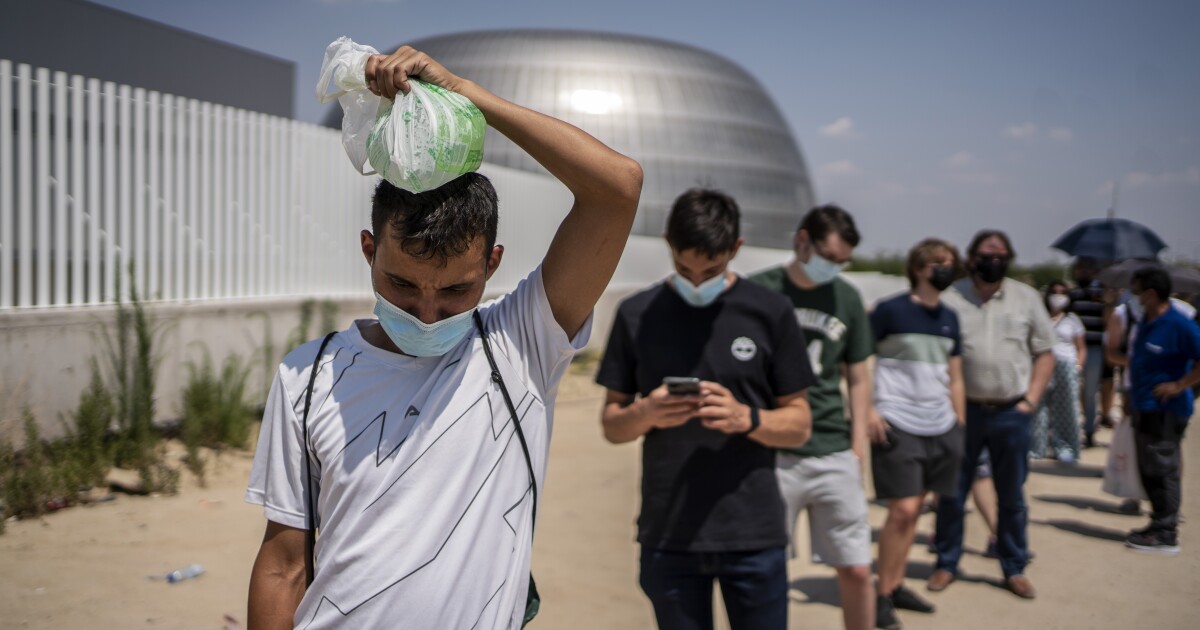BARCELONA —
Like too many Spanish twentysomethings, Sergio Rosado has seen the new variant of the coronavirus reach those who were too eager to break free when authorities lifted health restrictions as the vaccination campaign began to pick up pace.
But the 22-year-old student shares widespread public confidence in vaccines in the country and plans to get his shots as soon as his turn comes.
Several of Rosado’s friends caught COVID-19 at large parties, he noted. He also went out, but to non-crowded places, in controlled spaces and with masks.
Like its European Union partners, Spain began to administer its vaccines slowly, compared to Britain and the United States, after regulatory bodies approved the first vaccines. But once deliveries from pharmaceutical companies began to arrive, the country quickly gained ground.
After completing the vaccination of just 10% of its adults between January and the end of April, some 25 million people have already received their two injections, which places Spain among the vaccination leaders of the 27 countries of the European Union .
The vaccination campaign has relied on the efficient public health system, a well-organized vaccination program that catered to age groups and a population that is confident in the safety of childhood vaccines and therefore mostly resistant to skepticism. around COVID-19 vaccines.
“The vaccine is part of the genome of our citizens,” Amós García, president of the Spanish Association of Vaccination, told The Associated Press. “Our professionals have always been very clear about the benefits that vaccines have (…). They are always being strongly recommended when seeing a child ”.
Vaccination coverage in children in Spain is higher than 95%, he pointed out.
The Spanish public health system, which has suffered budget cuts in the last decade, was overwhelmed last year by the first wave of the virus, which has claimed at least 81,000 lives in the country.
But fears that the public health system would fall short of the massive vaccination campaign turned out to be unfounded. Information about who was eligible for the vaccine was widespread, and people did not hesitate to sign up when it was their age group’s turn. In general, the lines to get vaccinated moved quickly and unlike in France, there were no bureaucratic hurdles when people went to their local clinics or mass vaccination centers to get vaccinated.
It also helped that no politician, even on the extreme left or right, cast doubt on vaccines. The only political dispute over the vaccines revolved around delivery times, and claims by regional health authorities that they should arrive faster.
“This is not a question of progressives or conservatives. It is a public health issue, “said the Prime Minister, Pedro Sánchez, in statements to MSNBC during a visit to the United States last week.
Unlike Germany or France, Spain does not have a great anti-vaccine movement. More than 90% of public health workers have been vaccinated, compared to 42% of public health workers in France.
So while Germany and France have had to pressure skeptics and those who were delaying their vaccinations by making vaccinations mandatory for some jobs, such as paramedics and nursing home workers, the Spanish have needed little insistence.
By moving methodically from the oldest to the bottom, Spain has achieved its first goal: to prevent the most vulnerable from dying. But the emphasis on vaccines as salvation has also helped young people to let their guard down when curfews and mask regulations were lifted, just as the delta variant arrived.
The result is that, despite its successful vaccination campaign, Spain is now one of the hotbeds of new infections in Europe. Spain now registers more than 25,000 new cases a day compared to 3,400 a month ago, according to Our World in Data.
“A month ago when we lifted most of the restrictions, we didn’t call it ‘Freedom Day’ like England, but it was basically a big step towards more freedom,” Rafael Bengoa, former director of health systems at the World Health Organization and one of the leading experts in public health in Spain.
“This is one of the reasons why we have this epidemiological situation,” he said.
“If you want control of the pandemic in this situation, you have to have both the traditional public health restrictions and vaccinations,” Bengoa explained.
Some regions have reacted by recovering new restrictions, such as a night curfew in Catalonia.
Spain is counting on its vaccination program to advance rapidly in those under 40 years of age, and it seems that the desire to get vaccinated has not fallen with the generational change. The Spanish Center for Sociological Research said last week that nearly 90% of those surveyed under 35 said they wanted to get vaccinated.
Still, Bengoa believes the restrictions will remain in effect for some time.
“We have to explain to the population that this is here to stay,” he said. “We will control it. But (…) they are going to have to live with a virus that is more dangerous than the flu ”.
___
Hernán Muñoz in Barcelona, Aritz Parra in Madrid, and Angela Charlton in Paris contributed to this study.
–


